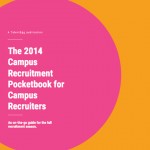When it comes to recruiting top talent, details distinguish the best candidate.
Exceptional students and grads are often cut from the same cloth: they’re memorable, have had great academic success and have built a solid foundation of relevant work experience throughout their post-secondary careers.
Recruiting a pool of high-quality candidates has the potential to elevate your employer brand and strengthen your workforce, but when competition for an open opportunity is fierce, narrowing down your top picks can feel impossible.
Extensive extracurricular involvement is a common indicator of top talent. This commitment reflects job-ready skills that are inherently valuable for entry-level hires.
Knowing how to identify the hard and soft skills extracurricular activities inspire can better inform your recruiting decisions and hiring choices.
Sports
From varsity teams to intramural leagues, students and grads who list athletic activities on their resumes have developed a solid set of skills to bring with them into the workplace. These include: the ability to work well on a team, integrity, leadership, dedication, and effective time management.
Tip: Students who played sports often excel when given the opportunity to take on a leadership role.
Debate club
Students and grads involved in debate teams refine their ability to communicate ideas effectively, identify and solve problems, think on their feet and speak confidently to large groups of people.
Tip: Students involved in this kind of extracurricular activity may present themselves differently in different contexts. Get a sense of their strengths by asking them where they felt they excelled the most on the debate team (for example, researching vs presenting topics).
Residence life
Being a residence advisor (RA) or assistant on campus is a great indication of an applicant’s ability to handle major responsibility. RAs are natural leaders who can manage a variety of issues, resolve conflict, facilitate events and supervise large groups of people.
Tip: Students who worked in residence are already equipped with the skills to be effective mentors to next year’s student hires, or other members of student team.
Peer tutoring
Students and grads who list peer tutoring on their resumes are able to go the extra mile for the benefit of others. They have an ability to comprehend and explain challenging concepts, work through problems and come up with solutions to get the job done.
Tip: Students who volunteered as peer tutors can be great motivators on a team.
Newspaper
Campus publications are a great place for students and grads to gain skills that are useful for any profession. These include: the ability to brainstorm ideas, writing and editing skills, critical thinking skills and the ability to work well under deadlines.
Tip: Students who were involved with campus publications often have experience pithing ideas in ideation meetings.
On-campus work
Volunteering in a university service position (tour guide, information booth attendant, orientation volunteer) demonstrates the discretion and customer service skills required to appropriately represent a brand.
Tip: Students who volunteered with on-campus programs often have the disposition to be an effective brand ambassador.
Student government
Whether they sit on the Board of Directors or are running a faculty-based student society, students and grads with student government experience on their resumes learn how to network effectively, work with others towards a common goal, manage and allocate resources and liaise between different interest groups.
Tip: Students who served in student government positions may be interested in getting involved in workplace committees or advisory boards once hired on.
Discussion: Which extracurricular activities do you find most valuable?






Leave a Reply
You must be logged in to post a comment.